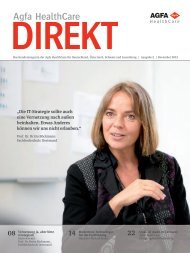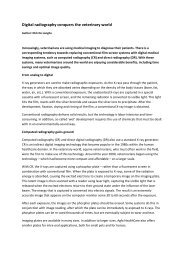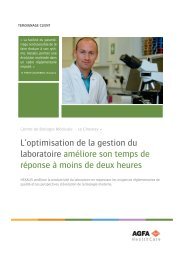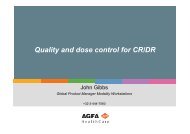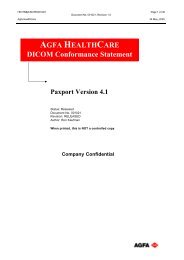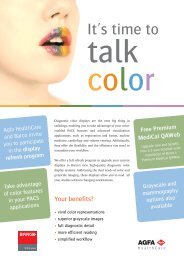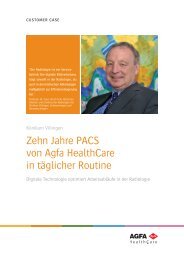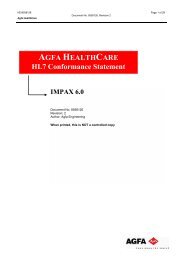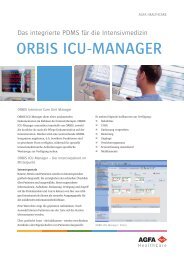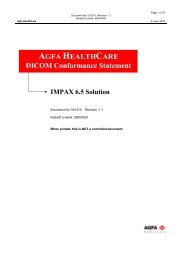AMC Hospital, Amsterdam, The NetherlandsGlobal Remote Incident Preventionservices bring peace of mind toradiology departmentGRIP increases uptime levels and reduces patient care delaysInterviewees Dr. Annette Bak, Manager of Radiology and Nuclear Medicine · Jan Wolters, Functional Application Specialistshowed the best overall score, andwhen they suggested that we supportour version of the IMPAX radiologysolution with Global Remote IncidentPrevention (GRIP), we were quiteconfident we would also benefit fromthis new service.”GRIP provides state-of-the-artelectronic monitoring of IMPAXRIS/PACS to help prevent serviceinterruptions or downtime surprisesin the healthcare IT environment. Apermanently open VPN connection linksGRIP to the <strong>Agfa</strong> <strong>HealthCare</strong> centralmonitoring center in Rijswijk, TheNetherlands.With its new GRIP remote monitoring andevent management and reporting solution,the Academic Medical Center (AMC) inAmsterdam, The Netherlands, expectsto reduce the incidence of technicalincidents. “With GRIP we can providehigher uptime levels to our users in theradiology department,” says FunctionalApplication Specialist Jan Wolters.12 THERE“It brings a peace of mind thatincidents will not affect our endusers.”Dr. Annette Bak,Manager of Radiology and Nuclear MedicineBefore AMC Hospital in Amsterdamdecided to install an IMPAX RIS/PACS solution from <strong>Agfa</strong> <strong>HealthCare</strong>,it went through a lengthy Europeantender process. “The upside of this wasthat we gained an in-depth view ofour IT-supported workflow,” says Dr.Annette Bak, Manager of Radiology andNuclear Medicine. “<strong>Agfa</strong> <strong>HealthCare</strong>Preventing delays in patientcareGRIP services consist of a real-time,centralized global monitoring centerand technical team, watching fordisruptive incidents at all connectedcustomer sites. “You can havecommunication problems between RISand PACS, where patients may not beincluded in the PACS queue, but theymay already be in the examinationroom,” says Jan Wolters. “Currently wehave some 80 open incidents. We lookinto each incident first ourselves, andif we cannot handle it, we refer to <strong>Agfa</strong><strong>HealthCare</strong>’s helpdesk.”At AMC Hospital, the GRIP solution isset up to act when certain thresholdsof event incidence are surpassed. Thethreshold determines when GRIP notifiesthe hospital, explains Jan Wolters.“At the moment we are fine-tuningthese thresholds together with <strong>Agfa</strong><strong>HealthCare</strong> and also implementing newmonitoring points in the system. A lowthreshold results in a high reportinglevel of incidents, many of which maynot be important. A high threshold maylead to a reduced preventive reliability.The balance is where we have the lowest
possible level of incident reportingby the users in radiology and nuclearmedicine, which means that GRIP takescare of the incidents before they actuallyoccur. Ideally, <strong>Agfa</strong> <strong>HealthCare</strong> would bemonitoring and handling the problemsfaster than our users can experiencethem.”Knowledge of a problem beforeit occursGRIP allows AMC Hospital to knowabout a problem before it occurs, andthis knowledge can enable staff toprevent the incident from taking placeat all. Says Dr. Annette Bak: “We clearlyexpect to benefit from GRIP from auser perspective. Upfront awareness ofpotential disruptions, 24/7, allows IT tointervene before outages or incidentsoccur and even help make sure theydo not occur in the future. It brings apeace of mind that incidents will notaffect us.”Jan Wolters provides an example. “Werecently were pre-notified of a memoryspace problem that would occur in oneof our servers. Because of this report,we were able to anticipate and avoidproblems. This allows us to increase ouruptime levels to our end users in thehospital.”Clinicians work efficiently andreliably, thanks to enhanceduptimeAMC Hospital has an SLA agreementoutlining uptime expectations, and <strong>Agfa</strong><strong>HealthCare</strong> is keen on keeping uptimeas high as possible and preventing anyunsettling downtime surprises. Thisis the win-win between both parties,says Jan Wolters. “Our clinicians needto be able to do their job reliably.This requires uptime of the servicesoffered by <strong>Agfa</strong> <strong>HealthCare</strong>. With ourparticular <strong>Agfa</strong> <strong>HealthCare</strong> systemconfiguration, our SLA is end-to-end99.84% guaranteed. The uptime ismeasured each quarter and needs tobe end-to-end all the way to the enduser. We use a stopwatch model whenincidents occur, allowing us to label anincident from P1, a major problem, toP4, a low relevance incident. GRIP canprevent incidents evolving from P4 toP1.”“The <strong>Agfa</strong> <strong>HealthCare</strong> GRIP solutionis a watchdog for AMC Hospital,delivering this service in a reliableway,” concludes Jan Wolters. “Constantmonitoring by the <strong>Agfa</strong> <strong>HealthCare</strong>technical team allows them to quickly“The <strong>Agfa</strong> <strong>HealthCare</strong> GRIPsolution is a watchdog for AMCHospital.”Jan Wolters, Functional Application Specialistdetect potential issues and take action,ranging from calling a local technicianto intervening remotely to correct thesituation. We are still fine-tuning, butthe potential is huge.”•SolutionGlobal Remote Incident Prevention (GRIP)services with:» Remote monitoring of the complete <strong>Agfa</strong><strong>HealthCare</strong> system infrastructure» Event management for fast action remotelywhen issues arise» Event reporting of all warnings with instantgraphical displays and historical records ofpast events» 24/7 SLA<strong>Agfa</strong> <strong>HealthCare</strong>’s contribution» Support IMPAX radiology solution with GlobalRemote Incident Prevention (GRIP) services» Define an SLA agreement focused on keepinghigh uptime and preventing downtime» Team up with AMC’s IT department andend users to find the right level of incidentreporting“With GRIP we can provide higheruptime levels to our end users.”Jan Wolters, Functional Application SpecialistDID YOU KNOW…» The Academic Medical Center was founded in1983, when two hospitals from the Amsterdamcity center, the Wilhelmina Gasthuis and theBinnengasthuis, merged with the medicalfaculty of the University of Amsterdam.» In collaboration with the city of Amsterdam,AMC Hospital is stimulating the developmentof a Medical Business Park: a whole range ofinnovative businesses and research institutesin the field of healthcare, biosciences and lifesciences.» AMC Hospital has 1,010 beds, and about 7,000employees.THERE 13



